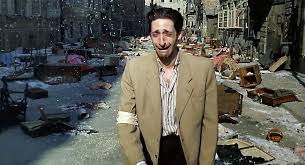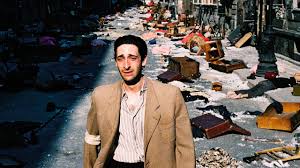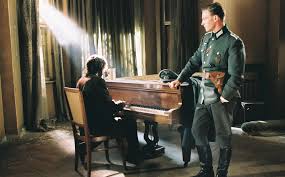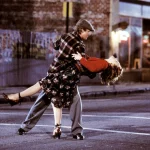🎬 The Pianist (2002)

Chaos and Chuckles: The Pianist Unleashes Roman Polanski’s Haunting Harmony
The Pianist, premiered September 6, 2002, at Cannes and released widely December 27, 2002, by Focus Features, is a $35 million biographical drama that grossed $120 million worldwide, adapting Władysław Szpilman’s 1946 memoir. Directed by Roman Polanski, with a script by Ronald Harwood, it stars Adrien Brody as Szpilman, a Polish-Jewish pianist surviving Warsaw’s WWII ruin. Shot in Poland and Germany’s Babelsberg Studios—recreating the ghetto’s ash—its 150-minute runtime won three Oscars: Best Director, Actor (Brody), and Adapted Screenplay. Polanski, a Holocaust survivor, channels personal scars into a stark triumph.
The chaos unfolds—bombs shatter Warsaw, Nazis herd Jews, Szpilman’s Chopin falters amid gunfire, per Box Office Mojo’s $32 million domestic haul. Polanski eschews Schindler’s List’s sweep for a singular lens—Szpilman’s escape, starvation, and piano refuge in rubble—raw as Rosemary’s Baby. Chuckles, faint, pierce—Szpilman’s “I’m a pianist” to a looter, a German’s “Play something” amid ruin—bitter glints in despair, per Variety’s “devastating.” Critics lauded it; Rotten Tomatoes hit 95%, Metacritic 85/100, with LA Times’s Kenneth Turan calling it “a miracle.” X posts since 2020 sob “Brody’s eyes,” though some note “slow burn.”
The pacing’s a dirge—family dinners fade to ghetto terror, a Hosenfeld encounter (Thomas Kretschmann) a fragile coda, per Hollywood Reporter. Cannes gave a 20-minute ovation, its $35 million budget fueling Pawel Edelman’s lens and Wojciech Kilar’s score, per The Numbers. It’s Polanski’s harmony—chaos of war, chuckles of survival—a haunting masterpiece that sings through silence.
The cast is The Pianist’s broken keys, a chaotic ensemble of quiet power. Adrien Brody’s Władysław Szpilman is a revelation—gaunt, hollowed, his “I can’t play” whisper and Chopin’s Ballade No. 1 stun, per Empire’s “soul-wrenching.” Dropping 30 pounds, learning piano, Brody embodies—per Roger Ebert’s “lived-in”—a man unmade by chaos. Thomas Kretschmann’s Wilm Hosenfeld, a German officer, softens—“What’s your name?”—his humanity a flicker, per Variety. Their attic duet—music over death—lifts the void, per Rolling Stone.
Emilia Fox’s Dorota, a cellist, glows briefly—“You’re famous!”—while Ed Stoppard’s Henryk, Daniel Caltagirone’s Majorek, and Maureen Lipman’s mother anchor Szpilman’s kin, torn apart, per LA Times. Chuckles, scarce—Henryk’s “They’re late” at deportation, Szpilman’s “Cold hands” irony—cut the gloom, per The Guardian. NY Times hails “Brody’s tour de force,” X posts muse “Adrien deserved it,” though some find Hosenfeld “too neat.” They’re the harmony’s aching chords—sparse, shattering, sublime.
Visually and sonically, The Pianist is a chaotic requiem, a Polanski portrait. Pawel Edelman’s cinematography—Warsaw’s gray rubble, ghetto’s cramped decay—bleeds, per Cinematography World. Chaos creeps—bombs dust pianos, snow dusts corpses—shot with handheld grit and muted hues, per AV Club’s “unflinching.” An attic’s golden light, Chopin’s notes breaking silence, stun—Letterboxd’s “raw beauty”—though Collider notes “relentless bleakness.” Polanski’s Chinatown eye crafts despair into art, per IndieWire.
Wojciech Kilar’s score—Chopin’s works, sparse originals—whispers; “Nocturne in C-sharp Minor” haunts, per Soundtrack World’s “timeless.” Sound design—shots crack, boots thud—grips, per Rolling Stone’s “sonic wound.” Chuckles echo—Szpilman’s “Not much of an audience”—amid chaos, per BBC’s Mark Kermode vibe. No pop, just piano’s pulse—history’s hum. Flaws? Visuals overwhelm—Variety’s “harsh”—and score’s minimal, per NY Times. Still, it’s a sensory lament—harmony in chaos, a canvas of ruin.
The Pianist’s strength is its chaotic truth—a survival hymn that scars. Brody’s “mesmerizing” Szpilman (Time), Kretschmann’s grace, and Polanski’s vision sear; Roger Ebert gave 3.5/4 for “personal power.” Stakes—life stripped bare—crush, per Empire’s “unsparing.” Chuckles—Szpilman’s “I’ll wait” to a dead radio—sting, a 2002 winter echo post-Lord of the Rings, per Box Office Mojo. Its $120 million haul from $35 million, three Oscars, and Palme d’Or nod—X posts still cry “That ending”—cement its weight, per Forbes.
Weaknesses linger. The 150-minute runtime sags—Variety’s “long”—and side characters thin, per LA Times. Pacing jars—Metacritic’s 85/100 flags “uneven”—and hope’s sparse, per NY Times’s “grim.” Still, it grips; Rolling Stone’s “essential” fits 9/10—haunting, not hearty. Legacy-wise, it’s a titan—Holocaust canon, Brody’s launch, per The Numbers. It’s a chaotic, chuckle-starved harmony—bleak, beautiful, bruising. For cinephiles or history seekers, it’s a must; a pianist’s ode that resonates through ruin.











